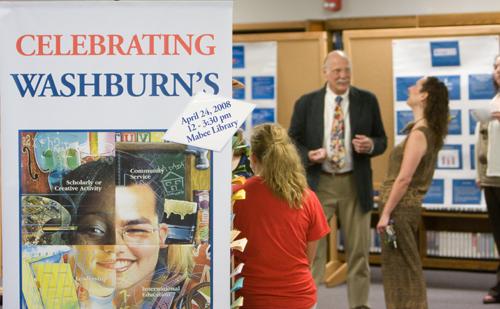WTE students primed for transformation
April 27, 2008
Washburn students displayed the fruits of their labor Thursday in the Mabee Library to show that they really were “transformers.”
Rick B. Ellis, human services professor and faculty advisor for Learning in the Community (LinC), gave the opening address for the Day of Transformation. Ellis has also acted as a mentor for student projects such as Student to Student Literacy Awareness.
In a pamphlet describing the Washburn Transformational Experience, Alisha Adams expounded on how she developed a community food pantry while a student at Washburn. The pantry is now called the East Topeka Hunger Project.
“Sometimes service makes me feel guilty or sad about my life and community,” said Adams. “It can be depressing to realize how much poverty and evil exists in the area. I think I’ve enjoyed all of the dissonance, thinking that bad things don’t really happen to good people or that really bad thing don’t happen in my area. On the reverse, these awakening experiences have strengthened my desire to fight for social justice and work as an advocate for justice and peace.”
Lora Biesenthel completed her Community Service project, a WTE option that requires a minimum of 150 hours, with the Student Coalition for Action in Literacy Education (SCALE), along with Kayla Barrett.
“The most satisfying part of the Transformational Experience was the relationships with the students so that they could open themselves in order to learn,” says Barrett.
Barrett realized that many students don’t realize the opportunities open to them.
Washburn faculty are also interested in the possibilities for student transformation and research. Kellis Bayless, biology lecturer, thinks the credits provided by the WTE to the students are worthwhile.
“Research can help students as a foundation for further work in a specialized field,” said Bayless.
A research display from Trisha Rhodes, a criminal justice student, showed her Scholarly Research project. It focused on the number of calls made and pressure put on small community as opposed to urban police officers and the stations the officers represent. The displays showed the work in a direct manner so that the attendees could see the hard work of the students. Rhodes also pointed out that the displays can show the student body possibilities for next year’s Transformational Experience.
“It’s great to show students what we’ve done that they might not have seen otherwise,” said Rhodes.



